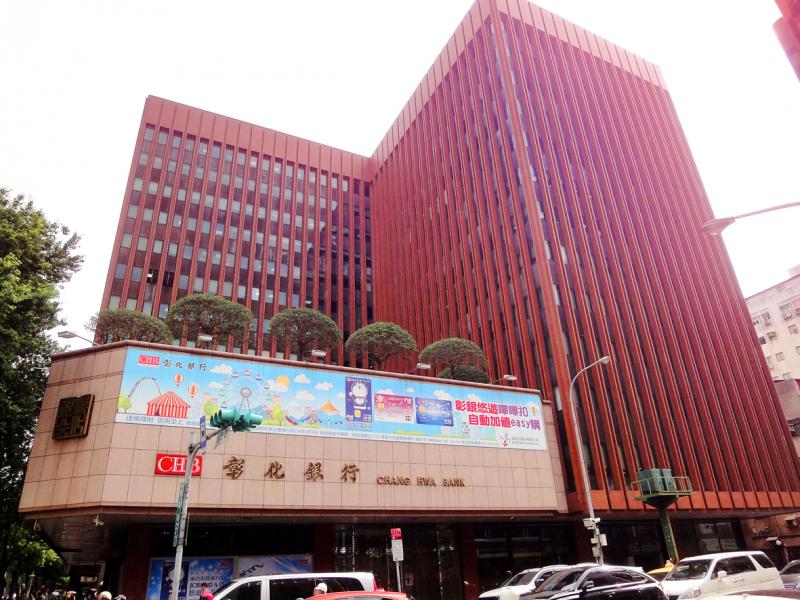Backed by an improving global operating environment, state-run Chang Hwa Commercial Bank (彰化銀行) yesterday said that it expects its growth momentum to recover this year, after net income tumbled by double-percentage points last year and remained weak in the first two months of this year.
Net income slumped 38.53 percent to NT$8.31 billion (US$291.3 million) last year, as bad loans at home and abroad increased, and drastic interest rate cuts weighed on interest and fee income, company data showed.
“We will make dynamic strategy adjustments to avoid a repeat of last year’s disappointing performance,” the company told an online investors’ conference.

Photo: Lu Kuan-cheng, Taipei Times
The bank a week ago appointed a new president, Chou Chao-Chung (周朝崇), to replace Huang Rui-mu (黃瑞沐), who stepped down to take responsibility for poor earnings.
Chou, who served in different positions in another state-run lender, First Commercial Bank (第一銀行), aims to strengthen Chang Hwa Bank’s overseas operations and risk controls.
Chang Hwa Bank is seeking to expand its loanbook by 5 to 6 percent this year, led by loans to small and medium-sized enterprises, and mortgage for people with real demand, the bank said.
Overseas outlets and local branches’ offshore banking units generated 37.5 percent of overall earnings last year, down from 44 percent in 2019, the bank said, adding that it is looking to raise their contributions to more than 40 percent.
Chou, who headed First Bank’s Phnom Penh branch, can share his professional expertise and experience in this area, the bank said.
Chang Hwa Bank would be engaged in loans to first-time home buyers, as the central bank’s two recent waves of credit controls are directed at multiple home owners and property investors, it said.
The bank added that it was not surprised at escalating yields in US Treasury and plans to raise its stakes in Taiwanese government and corporate bonds, as well as stocks that offer generous cash dividends.
“We will adopt more diversified trading tactics and be more active in pursuing investment gains this year as the world emerges from the COVID-19 pandemic,” it said.
Interest spread inched up 6 basis points from the third quarter to 1.15 percent late last year, while net interest margin gained 3 basis points to 0.88 percent, signs that the market has stabilized and would improve further, it said.
However, interest spread and margins remain low compared with the same time last year, accounting for weak earnings in the first two months of this year, the bank said.
Net interest income accounted for 70 percent of Chang Hwa’s revenue, while fee income and investment gains contributed 16.57 and 12.08 percent respectively, company data showed.

Intel Corp chief executive officer Lip-Bu Tan (陳立武) is expected to meet with Taiwanese suppliers next month in conjunction with the opening of the Computex Taipei trade show, supply chain sources said on Monday. The visit, the first for Tan to Taiwan since assuming his new post last month, would be aimed at enhancing Intel’s ties with suppliers in Taiwan as he attempts to help turn around the struggling US chipmaker, the sources said. Tan is to hold a banquet to celebrate Intel’s 40-year presence in Taiwan before Computex opens on May 20 and invite dozens of Taiwanese suppliers to exchange views

Application-specific integrated circuit designer Faraday Technology Corp (智原) yesterday said that although revenue this quarter would decline 30 percent from last quarter, it retained its full-year forecast of revenue growth of 100 percent. The company attributed the quarterly drop to a slowdown in customers’ production of chips using Faraday’s advanced packaging technology. The company is still confident about its revenue growth this year, given its strong “design-win” — or the projects it won to help customers design their chips, Faraday president Steve Wang (王國雍) told an online earnings conference. “The design-win this year is better than we expected. We believe we will win

Quanta Computer Inc (廣達) chairman Barry Lam (林百里) is expected to share his views about the artificial intelligence (AI) industry’s prospects during his speech at the company’s 37th anniversary ceremony, as AI servers have become a new growth engine for the equipment manufacturing service provider. Lam’s speech is much anticipated, as Quanta has risen as one of the world’s major AI server suppliers. The company reported a 30 percent year-on-year growth in consolidated revenue to NT$1.41 trillion (US$43.35 billion) last year, thanks to fast-growing demand for servers, especially those with AI capabilities. The company told investors in November last year that

Power supply and electronic components maker Delta Electronics Inc (台達電) yesterday said it plans to ship its new 1 megawatt charging systems for electric trucks and buses in the first half of next year at the earliest. The new charging piles, which deliver up to 1 megawatt of charging power, are designed for heavy-duty electric vehicles, and support a maximum current of 1,500 amperes and output of 1,250 volts, Delta said in a news release. “If everything goes smoothly, we could begin shipping those new charging systems as early as in the first half of next year,” a company official said. The new